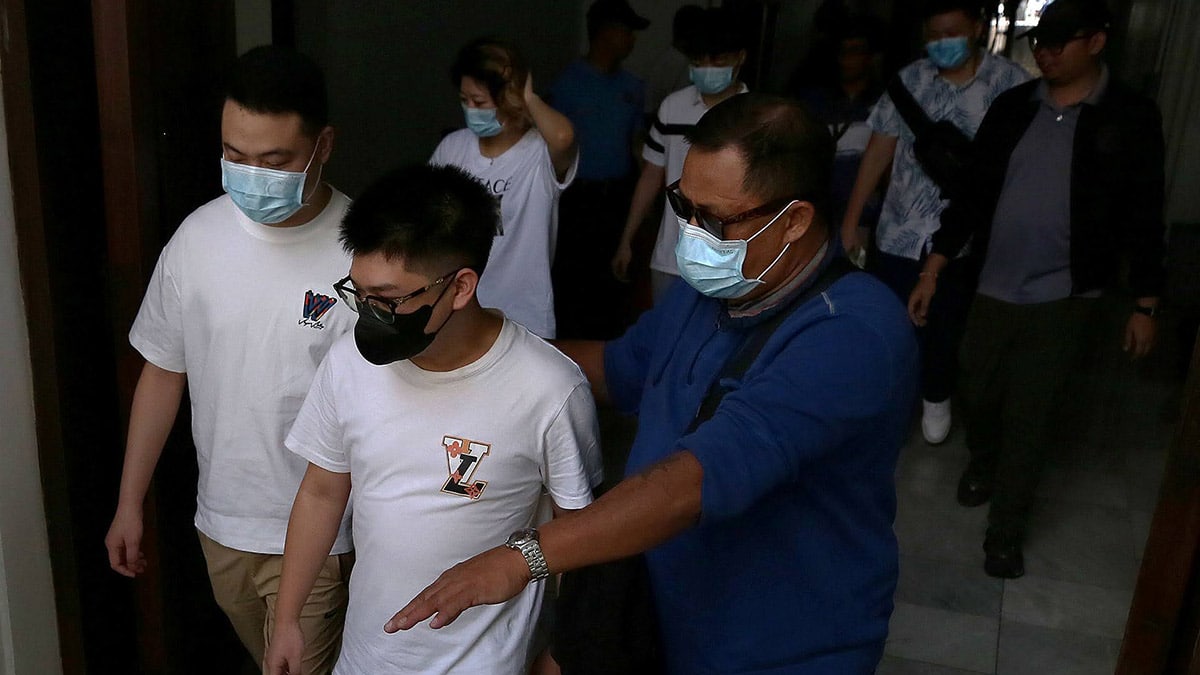
WITH ORDEALS TO TELL Some of the Chinese Pogo workers who filed a complaint for human trafficking against Cassandra Li Ong and 53 other people are seen at the Department of Justice on Tuesday. —Richard A. Reyes
MANILA, Philippines — Ten Chinese nationals have accused Lucky South 99 representative Cassandra Li Ong and 53 others of trafficking and forcing them to work at the illegal Philippine offshore gaming operator (Pogo) in Porac, Pampanga, where they were rescued during a raid in June.
In a complaint filed at the Department of Justice on Tuesday, the foreigners claimed they were kidnapped, held against their will, and coerced into becoming workers of Lucky South 99, one of two Pogo hubs in Central Luzon at the center of a deepening criminal investigation.
Aside from the Chinese nationals, the Presidential Anti-Organized Crime Commission (PAOCC) and the Philippine National Police were listed as complainants in the document charging Ong and the company with qualified human trafficking, a nonbailable offense.
READ: Pogo lessor ‘big boss’ an ex-Chinese cop, house told
“One of the Chinese nationals was lent P450,000 and gambled for three nights playing mahjong. When he couldn’t repay the debt, he was taken directly to Lucky South,” Prosecutor Ramoncito Ocampo said at a press briefing.
In a separate interview, Prosecutor James Escalona said the trafficking scheme involved victims being brought to the Pogo to pay off casino debts.
15-18 hours
They were promised freedom once the debt was fully settled. “[But] when they’re close to … paying off their remaining balance, [the Pogos] sell them to another Pogo. So, the victims just keep getting transferred from one place to another,” Escalona said.
These victims were allegedly being forced to work for 15 to 18 hours a day to run online or mobile phone scams.
“If you don’t do the work … you will be tortured. If you try to escape and get caught, you will be miserable,” Escalona said.
Lucky South 99 was raided and shuttered by law enforcers on June 4 on suspicion that it was involved in torture, human trafficking and illegal scamming activities.
In addition to Ong, other key respondents were Ronelyn Baterna, Lucky South 99’s corporate secretary; Dennis Cunanan, the company’s communications and government relations head; Duanren Wu, identified as the “top boss” of Whirlwind Corp. which leased land to the company; and Zhang Jie, president of Lucky South 99.
It was Zhang, a Singaporean, who assisted dismissed Bamban, Tarlac Mayor Alice Guo, in booking a hotel in Batam, Indonesia, when she fled the Philippines, according to PAOCC spokesperson Winston Casio, who said it proved that the Pogos in Bamban and Porac were “interconnected.”
A major shareholder of Whirlwind, Ong is also the girlfriend of Guo’s brother, Wesley.
Ong, who, along with Guo’s “sister” Shiela, was arrested in Indonesia on Aug. 22 and deported to the Philippines on the same day. She has since appeared in congressional hearings on illegal Pogos, where she denied serving as a “dummy” for big-time Pogo investors.
Aside from officials and incorporators of Lucky South 99, the complaint also implicated several individuals who were allegedly engaged in “selling Chinese nationals” to the Pogo, and bodyguards of the “Chinese bosses” who “tortured” employees caught escaping from the compound.
‘Piercing the veil’
Justice Undersecretary Nicholas Ty, head of the Inter-Agency Council Against Trafficking, said the prosecutors did not give credence to Ong’s “usual” defense that she was not involved in Pogo operations because she had only acted as a lessor.
“For our team, Lucky South 99 and Whirldwind Corp. are just one. That’s why we kept saying that there’s a conspiracy,” Ty said, citing the principle of “piercing the veil of corporate fiction.”
Under this doctrine, courts shall disregard the separate legal personality of a corporation’s separate legal status to hold its shareholders or directors personally liable for the corporation’s actions or debts.
“We will not allow criminals to use the corporation law, or layering, to carry out their criminal activities. This union of Lucky South 99 and Whirlwind is no ordinary business. One of the things said by our fiscal, by our complainants, is that this business is a criminal enterprise,” Ty said.
The prosecution is also looking to file criminal and civil forfeiture charges to allow the government to seize assets used for human trafficking, the official said.